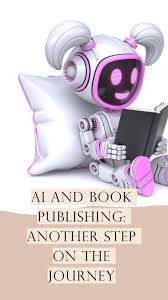June 9th, 2023
Last Monday Publishers Weekly issued my article “A Manifesto, of Sorts” about AI and book publishing (titled “AI Is About to Turn Book Publishing Upside-Down” in the online version). The article has been popular, even earning some buzz on LinkedIn and Twitter (in fact, more than I’ve ever had). I’ve been doing this for a long time, and when you write something that actually scores with readers, it feels pretty good.

I was looking forward to finding my article linked in today’s edition of “Top 5 Publishing Articles/Blog Posts of the Week,” the handy newsletter from Publishing Trends. Instead there was a link to an article called “AI and Its Effect on the Book Publishing Industry,” written by Navkiran Dhaliwal and appearing on Good e-Reader, “the leading news agency devoted to Audiobooks, E-Readers, Digital Publishing and eBooks.” I only glanced at it, disappointed that I’d been scooped by another author. Then I received an alert from a colleague pointing to the similarities with my article, and sure enough saw that I’d likely been plagiarized, and, quite possibly, with a little help from ChatGPT.
There are numerous indicators in Dhaliwal’s piece, but the least ambiguous is her comparison of the impact of AI to the “Macintosh, laser printers, and… a Linotype machine.” This is at the center of my “good enough” thesis around AI and publishing. It’s not the sort of comparison that many would make.
She also weaves a discussion of educational publishing into her post, another sure sign that she was cribbing from my article.
What struck me most about her post was that it read like she’d just fed my prose into an early GPT prototype, and emitted the output unedited. It’s a crude distillation, the language mangled. Is this how ChatGPT will be used against writers?
Then I took some time to check several other of Dhaliwal’s posts on Good e-Reader. It appears that plagiarism has become a bad habit for this writer. (I have to couch my language with phrasing like “it appears that” so that I’m not actually making the allegation that she plagiarized my work, only that it appears that she did. By such, and such, are lawsuits avoided.)

It seems to me likely that her article “Books.io: The Future of the Publishing Industry” is based on my “Ingram Backs Book.io, an NFT Book Marketplace” included in Publishers Weekly last fall. Her article is a mis-mash, but includes some unique wordplay from my piece. I use the phrase “incentivize readers” and she says that readers “receive incentives.” I discuss Book.io’s unique decentralized encrypted assets, and Dhaliwal writes that “it’s entirely decentralized and encrypted…” Perhaps she was inspired by another source.
Dhaliwal’s article “Fake Neuroscience Papers Detected By AI-Trained Tool,” published May 29, 2023, references and links to an academic paper “Fake Publications in Biomedical Science: Red-flagging Method Indicates Mass Production.” Hers would be a legitimate post if it was merely describing that scholarly article. But I can see that she was almost certainly plagiarizing another article that appeared a few weeks earlier in Science, the magazine published by the American Association for the Advancement of Science (AAAS), called “Fake scientific papers are alarmingly common.” (Interestingly, also, the problem that the researchers describe is not necessarily plagiarism, per se, but papers that were created “based on fabricated data, figures, tables, and text semi-automatically generated using artificial intelligence (AI).” Perhaps plagiarism is too much on her mind.)
The key, in this particular instance of Dhaliwal’s borrowing, is her mention of ChatGPT, which is not contained in the abstract she links to, but is part of the Science article. Further she includes a statement by the paper’s principal author, that it’s “Too Hard to Believe,” that this fakery is at hand, which is not a part of the paper, but is in the Science article (“It is just too hard to believe”).
I’m not sure how to conclude this post. I’m not angry or outraged. I feel bemused and a little bit amused. I feel saddened that the “content industry” has become such a morass that plagiarized text like this easily finds the light of day. I’m saddened that commercial web sites can function by publishing this derivative twaddle. But that’s not new. It’s not news.
I’ve reached out to the author, Navkiran Dhaliwal, and also to Michael Kozlowski, the publisher of Good e-Reader, for comment. I’ve heard nothing as yet, but will gladly update this post with their remarks.
June 10, 2023: Navkiran Dhaliwal has emailed me and expressed apologies, offering to make changes to the posts, asking whether to “remove the post or credit you within the post.” I replied that it was up to her. Tonight I see significant edits only to the AI post, though no credit is given. The links above are to her original posts via the Internet Archive (god bless ’em for this service!), so it’s possible to compare versions.
Michael Kozlowski emailed this evening: “Hello Thad, Nav is a new writer with our organization. I told her to cite sources and link to the original content where applicable. This issue will not occur again, and we understand your patience.”
June 12: As of today, there have been some edits to the posts, but no links or credits offered. Let the facts speak for themselves; I won’t return to this squalor. On to happier topics!